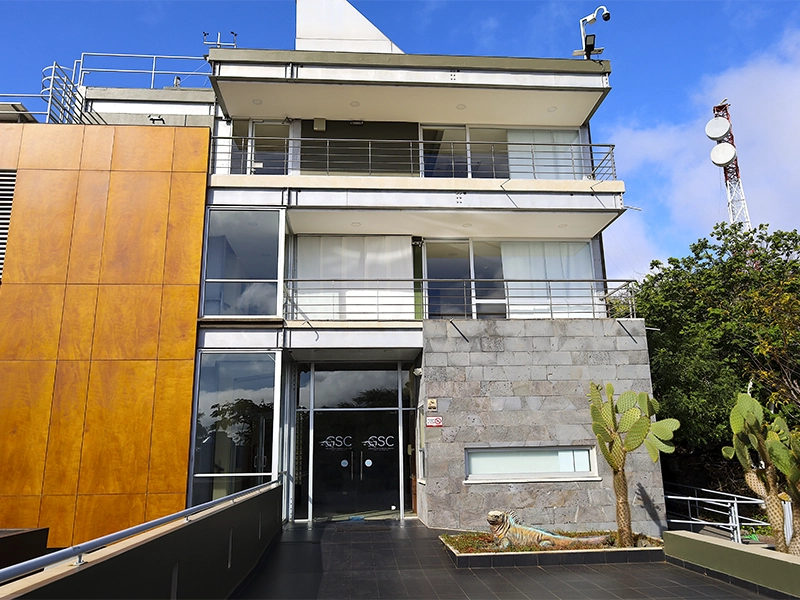Foto: @Andrew Russell
Nuestra historia comenzó con una visión compartida: llevar ciencia de clase mundial a uno de los lugares más extraordinarios de la Tierra.
Nuestra Historia

Se funda el Galapagos Science Center, marcando el inicio de una asociación única entre UNC y USFQ.

Lanzamiento de los primeros proyectos de investigación interdisciplinaria sobre salud comunitaria y cambio ambiental.

El GSC expande sus laboratorios y comienza a recibir estudiantes de ambas universidades durante todo el año.

El GSC apoya iniciativas de salud comunitaria durante la pandemia global.

El GSC continua liderando investigación que integre ciencia, educación y conservación.
Creemos que la ciencia con propósito comienza con comunidad, colaboración y respeto por la naturaleza.
Nuestra colaboración binacional une las fortalezas de dos universidades líderes: la excelencia en investigación global de UNC y la experiencia local y compromiso ambiental de la USFQ.
Juntos, empoderamos a científicos y comunidades para cocrear soluciones para el futuro de Galápagos.
Photo: David Liberio

Foto:©CameronPerry
173+
En áreas de biodiversidad, salud oceánica y bienestar comunitario.
852+
En programas de licenciatura, maestría y doctorado.
Nuestra investigación aporta a políticas e inspira conservación a nivel mundial.
Photo:
Descubre más

In 2022, the Galapagos Science Center (GSC) and the broader UNC & USFQ Galapagos Initiative will celebrate its 10th Anniversary. We are proud to announce the World Summit on Island Sustainability scheduled to be held on June 26–30, 2022 at the Galapagos Science Center and the Community Convention Center on San Cristobal Island.
The content of the World Summit will be distributed globally through social media and results documented through papers published in a book written as part of the Galapagos Book Series by Springer Nature and edited by Steve Walsh (UNC) & Carlos Mena (USFQ) as well as Jill Stewart (UNC) and Juan Pablo Muñoz (GSC/USC). The book will be inclusive and accessible by the broader island community including scientists, managers, residents, tourists, and government and non-government organizations.
While the most obvious goal of organizing the World Summit on Island Sustainability is to celebrate the 10th Anniversary of the GSC and the UNC-USFQ Galapagos Initiative, other goals will be addressed through special opportunities created as part of our operational planning of the World Summit.
For instance, we seek to elevate and highlight the Galapagos in the island conservation discourse, seeking to interact with other island networks in more obvious and conspicuous ways to benefit the Galapagos Islands, the UNC-USFQ Galapagos Initiative, and the world. We will seize the opportunity to further develop the I2N2 – International Islands Network-of-Networks. Further, we wish to highlight and emphasize multiple visions of a sustainable future for the Galapagos Islands and we cannot do this alone. Therefore, engaging the Ecuadorian Ministry of Environment, the Ministry of Tourism, the Government Council of Galapagos, the Galapagos National Park, and local Galapagos authorities, including government and non-government organizations and local citizen groups, is imperative.

Borrowing from Hawaii’s and Guam’s Green Growth Program and the Global Island Partnership, we wish to examine existing global programs that emphasize island sustainability and their incorporation into life, policies, and circumstances in the Galapagos Islands. We will also seek to enhance our connections with the institutional members of our International Galapagos Science Consortium and expand the Consortium through the recruitment of other member institutions. We will also work to benefit islands and their local communities by working with citizen groups as well as important NGOs who seek to improve the natural conditions in the Galapagos and diminish the impact of the human dimension on the future of Galapagos’ ecosystems.
Lastly, we will use the World Summit to benefit UNC & USFQ and our constituencies through a strong and vibrant communication plan about the World Summit, creating corporate relationships as sponsors, identifying funding goals through donors, and benefiting our study abroad program for student engagement in the Galapagos Islands. We plan to develop and issue a Galapagos Sustainability Communique after the World Summit that includes the vision and insights of all its participants for a sustainable Galapagos with applicability to global island settings.
We are eager to hear your perspective and have you join us at the World Summit on Island Sustainability!